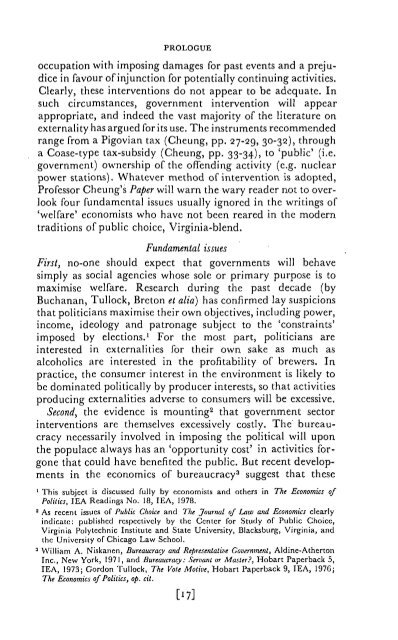THE MYTH OF SOCIAL COST.pdf - Institute of Economic Affairs
THE MYTH OF SOCIAL COST.pdf - Institute of Economic Affairs
THE MYTH OF SOCIAL COST.pdf - Institute of Economic Affairs
Create successful ePaper yourself
Turn your PDF publications into a flip-book with our unique Google optimized e-Paper software.
PROLOGUE<br />
occupation with imposing damages for past events and a prejudice<br />
in favour <strong>of</strong> injunction for potentially continuing activities.<br />
Clearly, these interventions do not appear to be adequate. In<br />
such circumstances, government intervention will appear<br />
appropriate, and indeed the vast majority <strong>of</strong> the literature on<br />
externality has argued for its use. The instruments recommended<br />
range from a Pigovian tax (Cheung, pp. 27-29, 30-32), through<br />
a Coase-type tax-subsidy (Cheung, pp. 33-34), to 'public' (i.e.<br />
government) ownership <strong>of</strong> the <strong>of</strong>fending activity (e.g. nuclear<br />
power stations). Whatever method <strong>of</strong> intervention is adopted,<br />
Pr<strong>of</strong>essor Cheung's Paper will warn the wary reader not to overlook<br />
four fundamental issues usually ignored in the writings <strong>of</strong><br />
'welfare' economists who have not been reared in the modern<br />
traditions <strong>of</strong> public choice, Virginia-blend.<br />
Fundamental issues<br />
First, no-one should expect that governments will behave<br />
simply as social agencies whose sole or primary purpose is to<br />
maximise welfare. Research during the past decade (by<br />
Buchanan, Tullock, Breton et alia) has confirmed lay suspicions<br />
that politicians maximise their own objectives, including power,<br />
income, ideology and patronage subject to the 'constraints'<br />
imposed by elections. 1 For the most part, politicians are<br />
interested in externalities for their own sake as much as<br />
alcoholics are interested in the pr<strong>of</strong>itability <strong>of</strong> brewers. In<br />
practice, the consumer interest in the environment is likely to<br />
be dominated politically by producer interests, so that activities<br />
producing externalities adverse to consumers will be excessive.<br />
Second, the evidence is mounting 2 that government sector<br />
interventions are themselves excessively costly. The bureaucracy<br />
necessarily involved in imposing the political will upon<br />
the populace always has an 'opportunity cost' in activities forgone<br />
that could have benefited the public. But recent developments<br />
in the economics <strong>of</strong> bureaucracy 3 suggest that these<br />
1 This subject is discussed fully by economists and others in The <strong>Economic</strong>s <strong>of</strong><br />
Politics, IEA Readings No. 18, IEA, 1978.<br />
2 As recent issues <strong>of</strong> Public Choice and The Journal <strong>of</strong> Law and <strong>Economic</strong>s clearly<br />
indicate: published respectively by the Center for Study <strong>of</strong> Public Choice,<br />
Virginia Polytechnic <strong>Institute</strong> and State University, Blacksburg, Virginia, and<br />
the University <strong>of</strong> Chicago Law School.<br />
3 William A. Niskanen, Bureaucracy and Representative Government, Aldine-Atherton<br />
Inc., New York, 1971, and Bureaucracy: Servant or Master?, Hobart Paperback 5,<br />
IEA, 1973; Gordon Tullock, The Vole Motive, Hobart Paperback 9, IEA, 1976;<br />
The <strong>Economic</strong>s <strong>of</strong> Politics, op. cil.<br />
[17]












